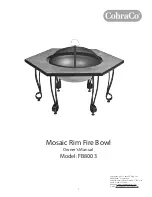
www.desatech.com
116557-01C
4
200,00
0
BTU/HR
1. Care must be taken to protect hands during this
step. Lift outer shell straight up as shown in Fig-
ure 2, until all three clips engage slots in lower
shell. Screw holes will line up at this point.
2. Lock clips into place with 3 screws as shown
in Figure 2. The heater must not be operated
unless the outer shell is properly extended and
fully locked into place.
Figure 2 - Lifting Outer Shell
(200,000 Btu Model Shown)
3 Screws
per Clip
Outer
Shell
Clip in Slot
of Lower
Shell
PROPANE SuPPLy
You must provide propane gas and propane tank(s).
Use this heater only with a propane vapor
withdrawal supply system. See Chapter 5 of the
Standard for Storage and Handling of Liquefied
Petroleum Gas, ANSI/NFPA 58
and/or
CAN/CGA
B149.2
. Your local library or fire department will
have this booklet.
This heater will operate with a 20 pound (9.07 kg)
propane tank. However, you can only operate it in
the LOW position during mildly cool weather for
a very short time. At higher heat settings or during
colder weather, you must use larger tanks.
The amount of propane gas ready for use from pro-
pane tanks varies. Two factors decide this amount.
1. The amount of propane gas in tank(s)
2. The temperature of tank(s)
The chart below shows the minimum number of
100 pound (45 kg) tanks needed to run the heater.
Connect tanks together with a manifold.
Average Temperature
Number
At Tank Location
Of Tanks
(80,000 Btu models)
20° F (-6.7° C) to 60° F (15.6° C)
1
0° F (-17.8° C) to 20° F (-6.7° C)
2
(200,000 Btu models)
20° F (-6.7° C) to 60° F (15.6° C)
2
0° F (-17.8° C) to 20° F (-6.7° C)
3
Less gas is vaporized at lower temperatures. Your
local propane gas dealer will help you select the
proper supply system.
INStALLAtION
WARNING: Review and un-
derstand the warnings in the
Safety Information
section, page
2. They are needed to safely op-
erate this heater. Follow all local
codes when using this heater.
CAUTION: Never ignite and/
or run this heater unless the
shells are fully extended and
locked into position.
OUTER SHELL
IMPORTANT:
When the heater is first removed
from carton, the outer shell is in the down posi-
tion. Protect hands before lifting outer shell. Never
grasp bare metal without hand protection.
CONNECTING TO GAS SUPPLy
WARNING: Test all gas piping
and connections for leaks after
installation or servicing. Never
use an open flame to check for
a leak. Apply a mixture of liquid
soap and water to all joints.
Bubbles forming show a leak.
Correct all leaks at once.
1. Provide propane supply system (see
Propane
Supply
).
2. Connect fuel gas fitting on hose/regulator
assembly to propane tank(s). Turn fuel
gas fitting counterclockwise into threads
on tank. Tighten firmly using a wrench.
IMPORTANT:
Tighten regulator with vent
pointing down. Pointing vent down protects
regulator from weather damage.
3. Connect hose to the valve inlet. Tighten firmly
using a wrench. You must use the regulator sup-
plied with heater even if propane tank has one.





































